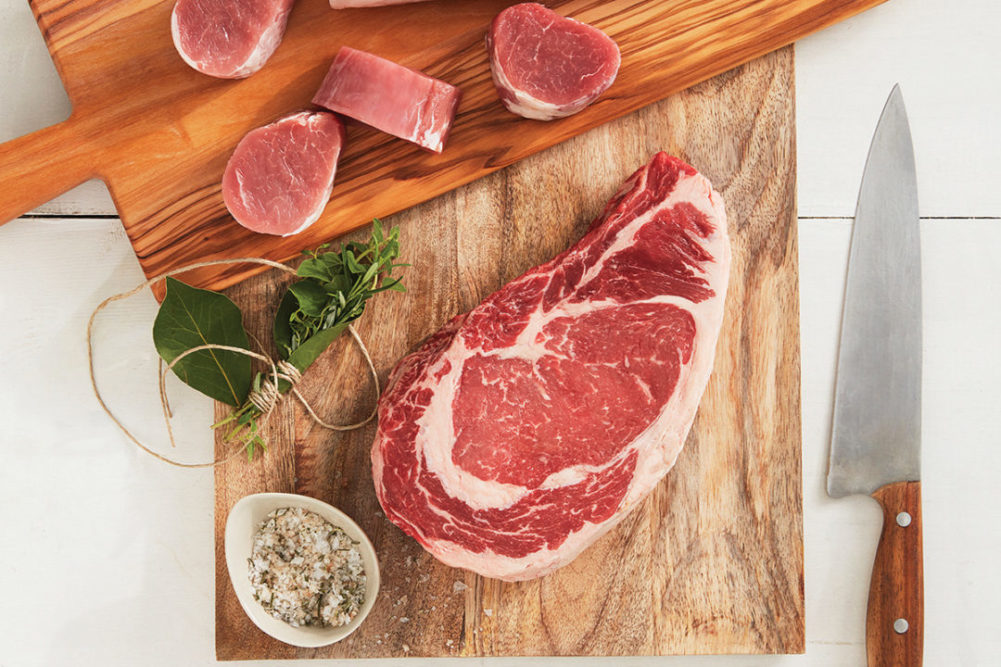KANSAS CITY, MO. — Demand for natural meats is strong and growing quickly, said Kent Harrison, vice president of marketing and premium programs for Tyson Fresh Meats, a division of Tyson Foods Inc.
Tyson’s Consumer Monitor research shows that across all age groups, but especially with millennials and Gen Z, the desire for natural product attributes is a high priority for shoppers, Harrison said.
“Our retail and foodservice customers have reacted to this trend, and they’ve turned to the product and brand solutions offered by Tyson Fresh Meats to meet that demand," he said.
When it comes to what constitutes a “natural meat,” Tyson follows the US Department of Agriculture’s (USDA) regulated definition as it appears in the agency’s Food Standards and Labeling Policy Book.
But the company goes further than the USDA standard to ensure its natural-branded products check as many boxes as possible.
“With Beef and pork (the USDA standard) is the regulatory minimum standard,” Harrison said. “When we think of the ‘natural’ offering inside of our product portfolio, it refers to our NAE (No Antibiotic Ever) program, Open Prairie Natural Meats.”
Open Prairie products, both beef and pork, must meet specifications that go well beyond the USDA definition of “minimally processed and no artificial ingredients,” Harrison said.
The additional key attributes required by Tyson include:
- No antibiotics ever
- No growth promoting hormones ever
- Never fed animal byproducts
Standards are comparably high for Tyson chicken products that bear the “natural” stamp.
In addition to meeting the USDA definitions, all Tyson Fresh Chicken products come from chickens raised NAE, said Stephen Silzer, senior director of marketing for Tyson Poultry.
Harrison added that another reason Tyson doesn’t position its “natural” beef and pork offering as only meeting the USDA minimum is that the standards for its programs are significantly more demanding and comprehensive.
“We’re confident that our Open Prairie Natural Meats brand will meet and exceed any future changes to the USDA definition,” he said.
Getting the most for your money
Budgets are being tightened these days, and shoppers today want to make sure when they do spend money, they’re buying quality food they feel good about feeding their family, said Mel Golden, Colo.-based Coleman Natural Foods.
“Consumers want to be confident in where their food is coming from and will be looking for meat products raised and processed in the US on farms that care about the humane treatment of their animals,” he said. “If consumers spend the extra dollar, they want to spend it for a reason, and we believe that reason is quality and value.”
Coleman Foods saw an interesting trend over the holidays. While consumers were saving money because of stay-at-home recommendations and limited travel, shoppers decided to get a little fancier and spend a little bit of that savings on holiday meals.
“They looked for higher-end cuts of meat, experimented with new recipes, and took extra care to pick products they could feel good about feeding their family,” Coleman said. “Convenience also came into play as first-time holiday ‘hosts’ sought to master some gourmet dishes, and save time and avoid disappointed taste buds on others.”
Coleman Natural Foods requires producers to raise their pigs in a 100% crate-free environment, which it claims results in a healthier, stronger animal able to exhibit natural behaviors throughout their life.
For added consumer confidence, Coleman said, the company’s production standards and farms are third-party audited by American Humane Certified, meeting or exceeding more than 200 science-based animal care standards.
According to a recent survey by American Humane, 65% of consumers look for humane animal care certifications on labels when shopping for proteins.
Coleman Natural Foods helped the USDA define what “natural” meant in the meat industry, and to help ensure consumers were confident about what they were putting on their plates, said Mel Coleman Jr., fifth generation family member and the company’s vice president.
“In the 1980s there was a small but growing number of consumers asking for meats from livestock raised without antibiotics or growth hormones,” Coleman said. “To meet that demand, and because most of those consumers were shopping at natural food stores, my dad jumped on the opportunity to raise cattle without the use of antibiotics or added growth hormones and decided he would call it ‘natural,’ thinking that ‘natural’ meats would be a perfect descriptor that would resonate with natural food store shoppers.”
Although the original USDA definition for natural, which addressed how livestock is raised, has been changed to focus more on how meat items are processed, the demand for naturally raised meats has evolved past what was once called a trend to a growing segment in most retailers’ meat cases, Coleman said.
In addition to ensuring that producers never use antibiotics, added growth hormones or promotants, every Coleman product is minimally processed and contains no artificial ingredients.


